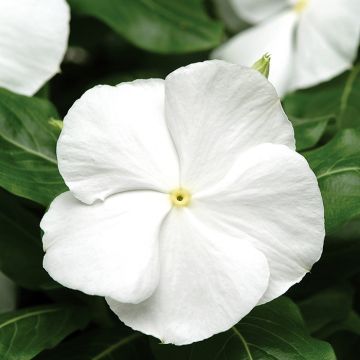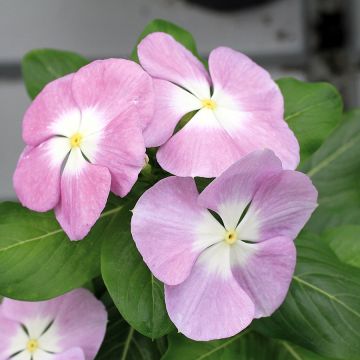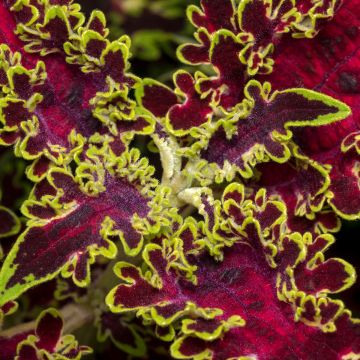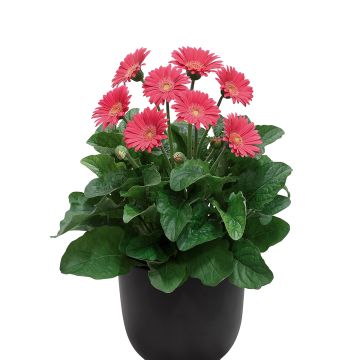

Pervenche de Madagascar Titan F1 Apricot
Catharanthus roseus Titan F1 Apricot - Madagascar periwinkle
Catharanthus roseus Titan F1 Apricot
Madagascar periwinkle, Rosy periwinkle, Cape periwinkle
The plant was very well packaged. However, all the leaves are yellow... On the other hand, these young plants have a lot more leaves and roots than the periwinkles received in buckets (10/11 cm) and paid a lot more for (11.70 €)! They were planted as soon as they arrived. We are waiting to see what happens next.
CHRISTINE, 19/05/2024
This item cannot be shipped to the selected country
Delivery charge from €5.90
More information
Schedule delivery date,
and select date in basket
This plant carries a 6 months recovery warranty
More information
We guarantee the quality of our plants for a full growing cycle, and will replace at our expense any plant that fails to recover under normal climatic and planting conditions.
From €5.90 for pickup delivery and €6.90 for home delivery
Express home delivery from €8.90.

Does this plant fit my garden?
Set up your Plantfit profile →
Description
Catharanthus roseus Titan Apricot belongs to a line of hybrids derived from C. roseus or Vinca rosea, selected for their particularly large flowers in various colours, their early-blooming, and their excellent performance in both garden and pot. This variety bears beautiful light pink flowers with salmon reflections adorned with a small carmine eye. Fast-growing, water-efficient, and heat resistant, Titan F1 periwinkles transform planters into flower baskets. Use their gorgeous blooms to create ephemeral beds overflowing with fantasy and freshness.
The Titan F1 Apricot periwinkle belongs to the Apocynaceae family, related to the perennial and hardy periwinkles we cultivate in our gardens. It is a tender perennial plant, grown as an annual in our climates. Its ancestor is endemic to Madagascar, where it grows up to 1800m (5905ft) above sea level. Catharanthus roseus is the origin of many cultivars with a much more compact habit and larger, brightly coloured flowers. The Titan F1 periwinkle forms a clump of leafy stems reaching about 35cm (14in) in height and spreading 30cm (12in) in one season. The rather fleshy and well-branched stems bear evergreen oval and entire leaves, 5 to 7cm (2 to 3in) long, with a glossy medium green colour. The flowers of this Apricot variety appear in the axils of the leaves, usually in the upper part of the stems, from May-June to October. Each flower has a short tube that opens into a wide corolla, measuring 6cm (2in), formed by 5 flat petals radiating in shades of light pink to flesh pink. The small centre of the flower is dark pink-red. The well-developed root system of the Titan F1 periwinkle helps the plants to adapt quickly and durably in flower beds.
Titan F1 periwinkles are fabulous plants for flowering pots, just like calibrachoas and surfinias. However, they are less commonly used in summer compositions, even though they are heat-tolerant, much less demanding, and frugal in terms of water. They can be used in a mix of colours, or combined in a large pot with Dichondra 'Silver Falls', bacopas, pelargoniums, and angelonias. They are also excellent plants for flower beds, accompanying wallflowers, cineraria maritime, Pennisetum Rubrum, and more.
Attention! All parts of the plant contain toxic alkaloids, from which effective molecules have been derived for the treatment of leukaemia.
Please be aware that our young plug plants are professional products intended for experienced gardeners. Upon receipt, repot and store them in sheltered areas (veranda, greenhouse, cold frame) at a temperature above 14°C (57.2°F) for a few weeks before planting them outdoors once the risk of frost has passed.
Report an error about the product description
Catharanthus roseus Titan F1 Apricot - Madagascar periwinkle in pictures
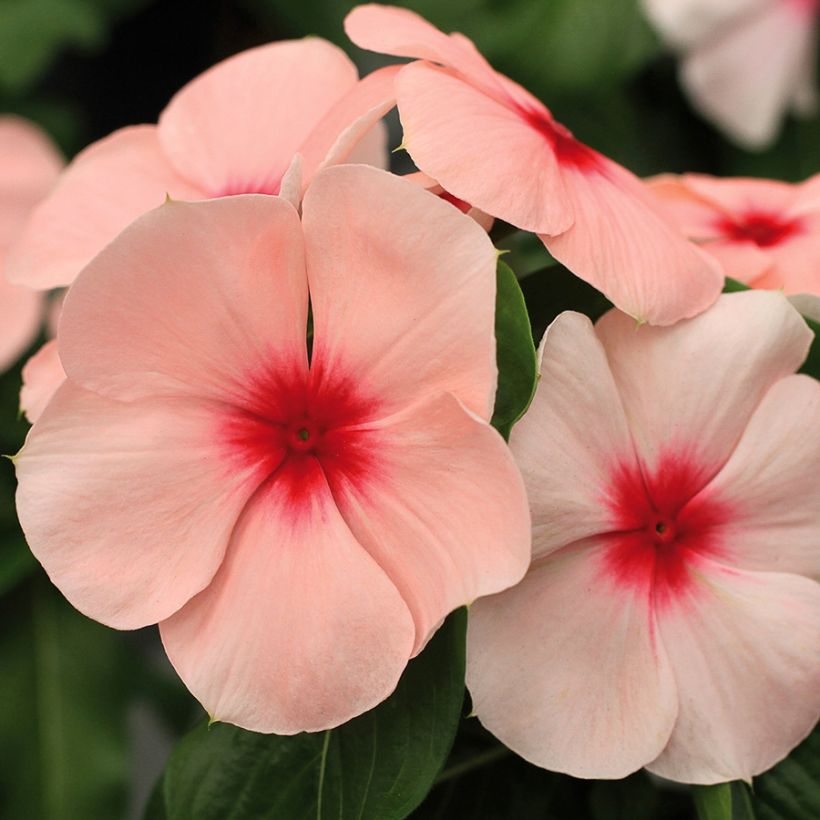

Flowering
Foliage
Plant habit
Botanical data
Catharanthus
roseus
Titan F1 Apricot
Apocynaceae
Madagascar periwinkle, Rosy periwinkle, Cape periwinkle
Cultivar or hybrid
Other Madagascar Periwinkles
Planting and care
Madagascar periwinkles, endemic to the Island of Madagascar, grow equally well in wet environments or in dry, almost arid areas, from sea level up to 1800m (5905ft) in altitude. In nature, they thrive in meadows, cultivated fields, open forests, and along paths. This goes to show how undemanding and easy to grow these plants are in the sun, partial shade, or even in full shade in hot regions. Their only requirement is well-drained soil, kept consistently moist during the flowering period. They are frost-tender perennial plants that should be sheltered in winter, by storing them in a very bright, minimally heated room. They do tolerate a rather dry atmosphere well. You can lightly pinch the tips of the shoots during the growing season to maintain a bushy habit, but without excess to avoid hindering flowering.
Planting period
Intended location
Care
-
, onOrder confirmed
Reply from on Promesse de fleurs
Plug plants - Annuals
Haven't found what you were looking for?
Hardiness is the lowest winter temperature a plant can endure without suffering serious damage or even dying. However, hardiness is affected by location (a sheltered area, such as a patio), protection (winter cover) and soil type (hardiness is improved by well-drained soil).

Photo Sharing Terms & Conditions
In order to encourage gardeners to interact and share their experiences, Promesse de fleurs offers various media enabling content to be uploaded onto its Site - in particular via the ‘Photo sharing’ module.
The User agrees to refrain from:
- Posting any content that is illegal, prejudicial, insulting, racist, inciteful to hatred, revisionist, contrary to public decency, that infringes on privacy or on the privacy rights of third parties, in particular the publicity rights of persons and goods, intellectual property rights, or the right to privacy.
- Submitting content on behalf of a third party;
- Impersonate the identity of a third party and/or publish any personal information about a third party;
In general, the User undertakes to refrain from any unethical behaviour.
All Content (in particular text, comments, files, images, photos, videos, creative works, etc.), which may be subject to property or intellectual property rights, image or other private rights, shall remain the property of the User, subject to the limited rights granted by the terms of the licence granted by Promesse de fleurs as stated below. Users are at liberty to publish or not to publish such Content on the Site, notably via the ‘Photo Sharing’ facility, and accept that this Content shall be made public and freely accessible, notably on the Internet.
Users further acknowledge, undertake to have ,and guarantee that they hold all necessary rights and permissions to publish such material on the Site, in particular with regard to the legislation in force pertaining to any privacy, property, intellectual property, image, or contractual rights, or rights of any other nature. By publishing such Content on the Site, Users acknowledge accepting full liability as publishers of the Content within the meaning of the law, and grant Promesse de fleurs, free of charge, an inclusive, worldwide licence for the said Content for the entire duration of its publication, including all reproduction, representation, up/downloading, displaying, performing, transmission, and storage rights.
Users also grant permission for their name to be linked to the Content and accept that this link may not always be made available.
By engaging in posting material, Users consent to their Content becoming automatically accessible on the Internet, in particular on other sites and/or blogs and/or web pages of the Promesse de fleurs site, including in particular social pages and the Promesse de fleurs catalogue.
Users may secure the removal of entrusted content free of charge by issuing a simple request via our contact form.
The flowering period indicated on our website applies to countries and regions located in USDA zone 8 (France, the United Kingdom, Ireland, the Netherlands, etc.)
It will vary according to where you live:
- In zones 9 to 10 (Italy, Spain, Greece, etc.), flowering will occur about 2 to 4 weeks earlier.
- In zones 6 to 7 (Germany, Poland, Slovenia, and lower mountainous regions), flowering will be delayed by 2 to 3 weeks.
- In zone 5 (Central Europe, Scandinavia), blooming will be delayed by 3 to 5 weeks.
In temperate climates, pruning of spring-flowering shrubs (forsythia, spireas, etc.) should be done just after flowering.
Pruning of summer-flowering shrubs (Indian Lilac, Perovskia, etc.) can be done in winter or spring.
In cold regions as well as with frost-sensitive plants, avoid pruning too early when severe frosts may still occur.
The planting period indicated on our website applies to countries and regions located in USDA zone 8 (France, United Kingdom, Ireland, Netherlands).
It will vary according to where you live:
- In Mediterranean zones (Marseille, Madrid, Milan, etc.), autumn and winter are the best planting periods.
- In continental zones (Strasbourg, Munich, Vienna, etc.), delay planting by 2 to 3 weeks in spring and bring it forward by 2 to 4 weeks in autumn.
- In mountainous regions (the Alps, Pyrenees, Carpathians, etc.), it is best to plant in late spring (May-June) or late summer (August-September).
The harvesting period indicated on our website applies to countries and regions in USDA zone 8 (France, England, Ireland, the Netherlands).
In colder areas (Scandinavia, Poland, Austria...) fruit and vegetable harvests are likely to be delayed by 3-4 weeks.
In warmer areas (Italy, Spain, Greece, etc.), harvesting will probably take place earlier, depending on weather conditions.
The sowing periods indicated on our website apply to countries and regions within USDA Zone 8 (France, UK, Ireland, Netherlands).
In colder areas (Scandinavia, Poland, Austria...), delay any outdoor sowing by 3-4 weeks, or sow under glass.
In warmer climes (Italy, Spain, Greece, etc.), bring outdoor sowing forward by a few weeks.

































